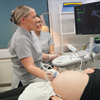Pregnancy is a life-changing journey that often comes with a lot of unsolicited advice and well-meaning but sometimes inaccurate information. For expectant mothers, it can be overwhelming to navigate the sea of myths and misconceptions about what’s safe, what’s normal, and what’s not. To help you separate fact from fiction, let’s delve into ten of the most common early pregnancy myths, offering detailed explanations to set your mind at ease.
1. You Can’t Exercise During Pregnancy
The Myth: Physical activity will harm the baby or increase the risk of miscarriage.
The Truth: Regular, moderate exercise is highly beneficial during pregnancy. It helps improve circulation, boosts mood, reduces stress, and may even make labour easier. Low-impact activities like walking, swimming, and prenatal yoga are excellent choices. However, certain activities—like high-contact sports or exercises with a high risk of falling—should be avoided. Always consult your midwife, GP, or obstetrician before starting a new exercise routine, especially if you have a high-risk pregnancy.
2. You’re Eating for Two
The Myth: Pregnancy is the perfect excuse to double your calorie intake because you’re nourishing another human.
The Truth: While it’s true that your nutritional needs increase, this doesn’t mean you need to eat twice as much. In the first trimester, your calorie requirements remain roughly the same. By the second trimester, you’ll only need about 300–400 extra calories per day. Instead of focusing on quantity, prioritise quality: include plenty of fruits, vegetables, lean proteins, whole grains, and healthy fats in your diet.
3. Morning Sickness Only Happens in the Morning
The Myth: Nausea and vomiting during pregnancy occur exclusively in the morning.
The Truth: The term “morning sickness” is misleading because nausea can occur at any time of the day or night. Hormonal changes, particularly an increase in human chorionic gonadotropin (hCG), are the primary culprits. For some women, symptoms may persist throughout the day, while for others, it may be intermittent. Eating small, frequent meals, staying hydrated, and avoiding triggers like strong smells can help manage nausea. Severe cases, known as hyperemesis gravidarum, require medical attention.
4. You Can’t Drink Coffee
The Myth: Any amount of caffeine during pregnancy will harm the baby.
The Truth: Moderate caffeine consumption is generally safe. Current NHS guidelines recommend limiting caffeine intake to 200 mg per day—equivalent to about one cup of coffee or two cups of tea. Excessive caffeine, however, may increase the risk of miscarriage or low birth weight. Be mindful of hidden caffeine in chocolate, energy drinks, and some medications.
5. You Can Predict the Baby’s Gender Based on Cravings
The Myth: Craving sweet foods means you’re having a girl, while savoury cravings indicate a boy.
The Truth: Cravings during pregnancy are influenced by hormonal changes, nutritional needs, and personal preferences—not your baby’s gender. While this myth can be fun to speculate about, the only reliable methods for determining gender are medical tests, such as an ultrasound or an early gender blood test.
6. You Should Avoid All Seafood
The Myth: Consuming seafood during pregnancy is dangerous because of mercury and other contaminants.
The Truth: Many types of seafood are not only safe but highly beneficial during pregnancy. Fish like salmon, sardines, and mackerel are rich in omega-3 fatty acids, which are crucial for your baby’s brain and eye development. However, avoid high-mercury fish like shark, swordfish, and king mackerel. The NHS recommends limiting oily fish to two portions per week. Ensure that all seafood is thoroughly cooked to avoid the risk of foodborne illnesses.
7. You Shouldn’t Fly While Pregnant
The Myth: Air travel is unsafe during pregnancy, especially in the early months.
The Truth: Flying is generally safe for most pregnant women, particularly during the second trimester, when risks of complications like miscarriage or preterm labour are lower. Airlines may have restrictions for women in their third trimester, so check their policies before booking. To reduce the risk of blood clots during long flights, move around regularly, stay hydrated, and consider wearing compression stockings.
8. Heartburn Means Your Baby Will Have Lots of Hair
The Myth: The severity of heartburn during pregnancy correlates with the amount of hair your baby will have at birth.
The Truth: This myth has some anecdotal evidence but is not a reliable indicator. Heartburn is caused by pregnancy hormones, particularly progesterone, which relax the valve between your stomach and oesophagus, allowing stomach acid to rise. This symptom has more to do with hormonal changes and your growing baby pressing on your stomach than hair growth.
9. You Can’t Have a Hot Bath
The Myth: Hot baths are dangerous and should be avoided entirely during pregnancy.
The Truth: Warm baths are safe and can be a great way to relax aching muscles and ease stress. However, excessively hot baths or saunas should be avoided, especially during the first trimester, as they can raise your core body temperature and potentially increase the risk of neural tube defects. A simple rule of thumb is to ensure the water feels comfortably warm, not scalding hot.
10. Bleeding Always Means Miscarriage
The Myth: Any form of bleeding during pregnancy is a sign of miscarriage.
The Truth: While bleeding can be alarming, light spotting or bleeding in early pregnancy is often harmless. It can occur due to implantation (when the fertilised egg attaches to the uterine lining) or cervical changes. However, heavy bleeding accompanied by severe cramps or pain should be reported to your healthcare provider immediately, as it may indicate a miscarriage or other complications.
Final Thoughts
The abundance of pregnancy myths can make an already emotional journey even more confusing. While it’s natural to seek advice and reassurance, remember that not all information is accurate or applicable to your unique circumstances. Always consult trusted medical professionals for guidance. By separating fact from fiction, you can approach your pregnancy with confidence and focus on what truly matters: preparing for the arrival of your baby.













 Packages & Prices
Packages & Prices  Important Info & Policies
Important Info & Policies  Your Scan
Your Scan